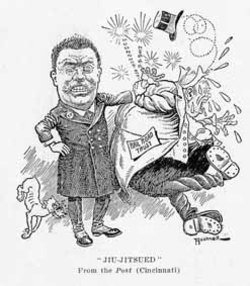The following essay should be considered Vol 11, No. 9 of my weekly e-mail newsletter, A-Clue.Com.
Stay tuned next week for our special 10th anniversary issue. Enjoy.
Were it not for the Iraq War, the $200 billion theft of ratepayer money by the companies now known as Verizon and AT&T would be the greatest rip-off of all time.
For a decade, in every state and before the FCC, these two Bells and their predecessor companies promised fast broadband in exchange for rate hikes. They claimed to need the money to install fiber throughout the country. They promised to serve "every Middlesex village and town" but instead they pocketed the money, using it to consolidate nearly the whole country into two monopolies which are now seeking to destroy the Internet as we know it, demanding pay-offs from sites to let them reach "their" customers, who are essentially captive.
This is already the case in cellular, where the same companies are the largest "service" providers. They control what equipment is used. They control the software on that equipment. They cripple the equipment — if they don’t want you to be able to move photos using Bluetooth because they’d rather force you to pay for the privilege, you pay. They claim to provide Internet service but that, too, is crippled. You reach only the sites they let you, and pay whatever they decide. They also expect a cut on every financial transaction made on their "service." Politicians who have long used the Internet to solicit funds find they can’t use cellular, because the carriers demand 50 cents on every dollar.
This phone trust, which is on the verge of becoming an Internet Trust (since they control the vast majority of the Internet Core in this country) have saddled Americans with slow service, ruinous prices, and obscene conditions. They have refused to invest in their networks for 10 years — that case is proven — and they have no real intention of starting now. No matter what they claim, their words are dust, because their actions speak louder.
But there’s a lot that can be done, even now.
The first and most important thing to do is recognize the nature of the problem, which is as American as pizza pie. (Cartoon from the blog QuestionItNow.)
It’s an antitrust problem.
The fight against rapacious monopoly has been ongoing in American law for over 115 years. The Sherman Anti-Trust Act of 1890, which is the heart of American law on the subject, takes its name from the brother of William Tecumseh Sherman.
And that law can, properly applied, slice through AT&T like Billy Sherman sliced through Georgia.
What we need is a political consensus, and leadership, which is determined to wield it on behalf of the American people. As was true three political generations ago we need a Teddy Roosevelt who will hold the monopolists’ feet to the fire and either break them up, as was done with Standard Oil, or place them under strict rate regulation, as was done with the original AT&T.
Here’s my program:
Regulate the equipment, not the network — The technical fact is that we can get a lot more bits out of our current copper wires than we are presently getting, a ton more. The 802.11 frequencies are far more heavily-used, carrying far more traffic and for much lower cost, than the proprietary frequencies sold by the government over the last decade. We need more unlicensed frequencies opened up, so that equipment makers can innovate new solutions carrying more bits, in a competitive market.
Make it all Internet — There is no reason to have a voice phone network. Voice Over IP (VOIP) technology has been around for nearly a decade. Voice is a low bandwidth application. Take that off the wires and you can run 7 Mbps of data using 1998 technology, and I can guarantee that, with newer technology, you can run data even faster. Through existing wires, to existing customers. No upgrade needed, hardly any money.
The biggest impediment to this is the century-long marriage the phone networks have with government. Money greases it. Tax money. Every phone line, every call, and every bill now has taxes attached to it, taxes that disappear once the phone network does. But here’s where we find out where today’s conservatives really stand. They should be anxious to cut taxes. Or do they stand with wealth and monopoly instead?
Guarantee a Competitive Core — The biggest threat to a competitive Internet market is the dominance Verizon and AT&T now have over the core of the U.S. Internet. This needs to be broken up. This can be done either through forced asset sales, the break-up of their ISP businesses, or tax incentives for new providers to light dark fiber. DWDM (colors on fiber) means that bulk transport of bits should be essentially free, and that the price should be falling over time. We need to assure that will be the case, because if Verizon and AT&T retain their present market control they will do to it what they have done to cellular and local service.
Conventional wisdom tells us that such a program is radical and impossible. Conventional wisdom be damned. There is nothing Communist or Socialist in what I’m proposing. It’s a very Republican program.
All we need is leadership willing to implement it, which is based on a simple understanding that the Internet is the modern highway system, the way in which the raw materials and finished goods of the Idea Revolution reach their markets. And if our system isn’t the best in the world, our economy won’t be, either.













There is a very simple piece of regulation that can cure 90+% of the ills in telecom/Internet: structural separation. In short, the network owner cannot offer retail service and a retail service provider cannot own a network. Some claim this solution can never be implemented, but it has been at least partially implemented on the electric utilities of several states. Pennsylvania almost forced Verizon to do this, but legislators lost their nerve at the 11th hour (Verizon threatened to drastically reduce workforce in the state). How did Verizon repay PA for this capitulation? Well, it is more than 6 years later and many parts of the state remain without Verizon DSL and EVDO, let alone the almost total lack of FiOS. The lesson that appeasement is completely the wrong strategy when dealing with big corporations should have been learned by now.
There is a very simple piece of regulation that can cure 90+% of the ills in telecom/Internet: structural separation. In short, the network owner cannot offer retail service and a retail service provider cannot own a network. Some claim this solution can never be implemented, but it has been at least partially implemented on the electric utilities of several states. Pennsylvania almost forced Verizon to do this, but legislators lost their nerve at the 11th hour (Verizon threatened to drastically reduce workforce in the state). How did Verizon repay PA for this capitulation? Well, it is more than 6 years later and many parts of the state remain without Verizon DSL and EVDO, let alone the almost total lack of FiOS. The lesson that appeasement is completely the wrong strategy when dealing with big corporations should have been learned by now.